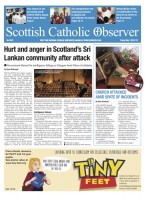May 3 | ![]() 0 COMMENTS
0 COMMENTS ![]() print
print

Real life vs fantasy: examining Freddie Mercury’s ‘ode to nihilism’ and the nature of meaning
In his letter from America, Brandon McGinley rejects cultural nihilism
Is this the real life? Is it just fantasy? These are the words Freddie Mercury sings to introduce his ode to nihilism, Bohemian Rhapsody.
While the meaning of the song’s lyrics will be contested until the Second Coming, this is clear enough: the narrator embraces ‘reality’ — but concludes that this means ‘nothing really matters.’
Far be it for me to agree with Freddie Mercury, but if ‘reality’ is godless, then he’s right.
As the murderer Raskolnikov argued in Crime and Punishment, without God, ‘all is permitted.’
And yet in both the Queen song and the Dostoevsky novel, the transgressor is wracked by guilt and confusion and self-loathing (‘sometimes wish I’d never been born at all’).
The godless, meaningless ‘reality’ doesn’t live up to the billing: our choices do matter, and there’s no escaping it.
Freddie Mercury wallows in despair until the end; Raskolnikov finds Christ and forgiveness and peace—that is, the unseen reality that brings meaning to life and order to our souls.
It’s easy to set the practice of the Faith and the practicality of this world against one another.
Indeed, the saints tend not to be pragmatic in this-worldly terms (St Thomas More is a notable exception), and many acted in ways that were seen as downright bizarre, embracing concepts like contemplation, mendicancy and extreme fasting in their bids to save souls and change the world.
‘Practical’ pursuits
And in our own lives, we often feel like prayer and liturgy take time away from more ‘practical’ pursuits, while adherence to the Church’s moral teachings, especially these days, can put professional or political advancement at risk.
To secular modern people, and even sometimes to us, the Christian life can seem fantastical—a denial of realism in favour of unproductive and even vain supernaturalism.
But we have to ask ourselves: what is the real life? And what is fantasy?
Reality itself, we affirm at every Mass, was created by God. More than that: St Thomas Aquinas would tell us that God simply is Being, and that He holds all of existence in, well, existence at every moment.
Fantasy
And so, what could be more realistic than worshipping Him in liturgy, praising and thanking Him in prayer, and honouring Him by dedicating our lives, and the choices that constitute them, to Him?
It is the world that denies God, His providence, His generosity, His love, and His grace that is the fantasy.
The notion that this is all there is, that we rely entirely on our own strength and wits for flourishing, that only our subjective judgment and that of our fellow men can be the measure of right and wrong, success or failure — this is not hard-nosed realism, but a fiction just as fantastical as any madman’s delusion.
Holiness
We do no good to pretend that fantasy is reality. We do no good, in favour of worldly ‘practicality,’ to pretend that sacramental grace can’t elevate and even perfect our nature, that prayer and fasting can’t be genuinely efficacious, or that virtues must be set aside in order to achieve political and professional goals.
Holiness is found in placing our souls in right order with God.
This order requires acknowledgement of the simple reality of God — that all goodness comes from Him and therefore that our choices are good when they are ordered back to Him.
From that divine harmony emerges peace — peace of soul, peace of mind, and even peace among persons.
As it is for individuals, therefore, so is it for communities and even nations.
Rejecting reality
When we treat the Church as just one religious institution among many, when we act like the Sacraments are merely matters of private devotion rather than wellsprings of grace for all, when we submit fundamental questions of truth and goodness to a vote, we may think we are sublimating contentious religious questions in the interest of public peace, but we are really denying the very reality on which peace must be based.
If this sounds fantastical, it’s only because we’ve been so well catechised by the modern world that sees reality — the genuine reality that transcends our political categories and even our senses, the reality where authority rests finally in Heaven rather than a parliament or a board room — as a threat.
We needn’t worry, though. We know reality, and we’ve been offered the grace to accept it. And so the question is: will we embrace the real life? Or just the fantasy?










